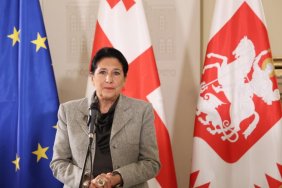The Office of the Public Defender of Georgia on Monday announced that the OSCE/ODIHR had issued a legal report condemning the recent abolition of gender quotas in Georgia.
The report, prepared in response to an appeal from the Georgian Public Defender, said that the new laws were incompatible with international human rights standards aimed at eliminating discrimination against women in political and public life.
The report criticized the Georgian Parliament for hastily discussing and passing the relevant draft laws within a span of four days. The final, third reading took place on April 4, and on May 15, the Parliament overrode a veto from the President of Georgia.
The report outlined the quota system aimed to achieve de facto equality and contributed to the gradual increase of women's representation in the country, and added there was no evidence to suggest that the abolition of gender quotas was necessary based on constitutionality, compliance with international obligations, inefficiency, or because it was no longer needed. It further highlighted that despite the slow but steady improvement in gender balance within the Georgian Parliament due to mandatory gender quotas and financial incentives, representation remained low compared to other OSCE countries and fell short of international standards and recommendations.
The report also pointed out significant procedural flaws and noted that the explanatory cards accompanying the draft laws lacked specific evidence, data, or in-depth analysis of the gender quota mechanism or its possible alternatives.
In addition, the OSCE/ODIHR report criticized the rushed legislative process, inadequate and non-inclusive participation in the review process, and the absence of consultations with relevant stakeholders.
It also highlighted the negative implications of altering essential elements of the electoral system close to elections and the neglect of the principle of stability in electoral legislation.
The report concluded with a detailed review of international commitments to promoting gender equality in political and public life and offered specific recommendations to address the issue.






